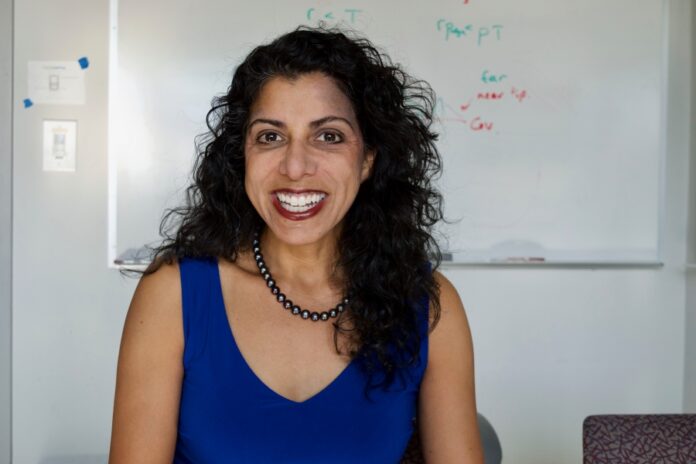A UC Davis professor makes revelations about her journey, as well as her research on the complexity of systems
How are monkey societies, power grids and nanomechanical oscillators related? That is one of the questions that Raissa D’Souza, a professor of computer science and a mechanical and aerospace engineering at UC Davis is trying to answer. Scientists often study specific systems, sociologists investigate social networks and engineers study transportation networks. Yet D’souza wants to look at the basic principles which govern all complex systems. These interesting questions have led to one of the most successful periods in her scientific career; she is leading a multi-university investigation into these complex systems. The questions she is asking have been a long time coming.
In her years of high school in the suburbs of Chicago, D’Souza enjoyed logic puzzles and calculus. Her school didn’t offer physics but after studying derivatives and vectors in her math classes, she knew that she was interested in using math to describe the world.
“Seeing how to connect math to something tangible was really exciting,” D’Souza said.
At the University of Illinois Urbana-Champaign, D’Souza studied physics and philosophy. Her choice of study was an early incarnation of the interdisciplinary approach D’Souza has taken throughout her career. At UC Davis she works with scientists from across the academic spectrum.
“Many of the really exciting things in the world around us are highly interdisciplinary,” D’Souza said. “We need sociologists and engineers and mathematicians and physicists, and philosophers and artists all working together to solve problems.
During her summers at college, she interned at Bell laboratories training as an experimentalist. When she finished her undergraduate degree, she thought she would continue down that path at M.I.T. for her doctorate. Yet, when she arrived at graduate school, her plans changed.
“I showed up thinking that I would do what I had done in those research internships which was experimental atomic physics.” D’Souza said. “When I started grad school, I realized I was more interested in the basic fundamental questions than engineering a system to do a specific experiment.”
D’Souza discovered the field of complex systems: an area of physics focused on the behavior of systems that are difficult to model. In particular, she was fascinated by how simple interactions between independent actors could lead to incredibly complex emergent behaviors. A classic example of this phenomena occurs in ant colonies; each insect has limited capabilities and means of communication, yet ant colonies can accomplish incredible feats without centralized direction.
“I got really interested in what are called complex systems; looking at systems that have organized global behaviors that we wouldn’t have predicted which emerge from the interactions of simple microscopic elements” D’Souza said. “I really wanted to understand how I could use the tools that I gained in statistical physics to study emergent behaviors of collections of simple elements.”
At M.I.T she found researchers that were studying these behaviors in rigorous mathematical and scientific ways. She sought out those professors and did her thesis on the topic.
D’Souza’s technical training is not the only thing that informs her research. Her identity and upbringing are also central to who she has become as a scientist.
Raissa D’Souza is a unique name. Raissa is Russian, and D’Souza is Portuguese. The name is indicative of her diverse background and childhood. Her father is from India and her mother from Chile, and she grew up in an Irish neighborhood. According to D’Souza, this great diversity shaped her world view. As a child, she traveled to Chile and India regularly.
“Going to India was very mind expanding to see that most people in the world don’t live in suburban homes going to grammar school across the street,” she said.
Yet, like most non-white, non-male researchers, D’Souza’s background also made it more difficult to fit into the academic world. Still, D’Souza believes her outsider status has been an important aspect of her career.
“I’ve always not fit in, and it’s a little difficult to not fit in, but I think that not fitting in is what gives you that outsider’s perspective and creativity,” D’Souza said. “If we all think the same way we are not going to make progress, so we really need diversity of thought, especially as we are tackling much more challenging global problems.”
After graduate school, D’Souza had the opportunity to go back to Bell Laboratories to study theory, and then work at Microsoft research. Both experiences helped her further refine her interests. Then D’Souza arrived at UC Davis, and today her background, identify and career path have led to her current research query.
“Networks are so diverse, they are so massive, they have so many different realms that they live in, so what we are trying to do with this bigger project is think about; where is the complexity? Is it in the node, or in the network connectivity pattern, or both?”
Written by: Peter Smith— science@theaggie.org




